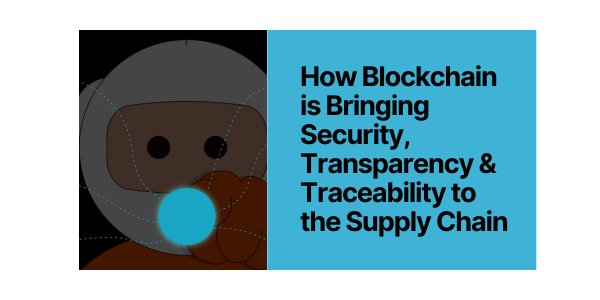How Blockchain is Bringing Security, Transparency & Traceability to the Supply Chain
Jim Lodwick
July 12,2018


A blockchain is a type of shared, continuously-updated, chronologically-ordered database, in which each individual record (block) is distributed across a network with a link to the previous block using cryptography. All data and transactions are synchronised across this network, with each participant verifying the work and calculations of others.
It cannot be controlled by one single entity, there is no one point of failure, and it cannot be corrupted. Transparency is assured because data is embedded within the network as a whole so by definition it is public, while the more participants there are in a blockchain, the more secure it becomes (because a hacker needs to control the majority of its computing power to manipulate transactions).
As business pressures continue to mount in a world where change is a constant, organisations are gravitating to more fluid and agile alliances that will enable optimum methodologies and increase profitability. Blockchain technology provides many of these answers, and is therefore causing a stir across many industries.
The increasing complexities of the supply chain and logistics sector make it ever more important to share real-time data in a secure manner.
Using blockchain technology, data from the huge array of sensors that are part of the digital internet of things (IoT) can now be captured and stored without any risk of it being tampered with. Users can view and add information to their heart’s content, and as more detail is accumulated a comprehensive chain of information develops, which provides clear audit and traceability trails.
Blockchain enables a vast and permanent trusted database of key facts that can be shared within business networks. It’s no longer necessary to piece together the jigsaw using several versions of Excel spreadsheets along with input requested from partners and suppliers and the results of arbitrary assumptions to fill in the inevitable gaps caused by an analogue system.
Instead, critical processes can now be intrinsically managed and safeguarded.
The food industry provides a useful example of blockchain at work. Traceability within the food and ingredients supply chain is of paramount importance as both retailers and wholesalers focus on optimum quality. Precise details recorded at each juncture of the supply chain drive considerable added value in terms of food safety and limit unnecessary product recalls.
For instance, food items often need to be kept within a mandatory temperature range. During transit, delivery vehicle sensors can provide regular temperature readings, which are immediately available (and therefore auditable). Any issues such as the product being unrefrigerated for any length of time, vehicle doors being left open for excessive periods and the temperatures to which it was exposed during this period, are again recorded and accessible. From here whether or not to recall a product and which batches are affected is a quick and straightforward decision.
This is essential in an industry where the effect of a mistake can result in life threatening circumstances. Reduced administration helps to minimise the time it takes to resolve issues, as does a complete and accurate centralised database that can be accesses within seconds.
Delving further into the supply chain, the opportunities and possibilities enabled by blockchain technology are endless.
These include easily locating returnable equipment such as pallets and crates by recording the data on each. (These items are regularly lost in the food industry for example and companies that are unable to return them for reuse are held liable for lost equipment penalties, suffering significant losses as a result.) The blockchain could also serve for instance as the trusted repository for insurance claims, preventing duplicate or bogus requests and ensuring a continuous chain of key details such as previous claims and no claims bonuses.
The introduction of such technologies can drive transparency, data accuracy and as a result remove unnecessary disputes and administration. Furthermore, as we head into a world controlled by IoT and automation, with wearables, and smart cars, home and cities being a facet of everyday life, the capability of blockchain technology to support them will become both more necessary and apparent.
To find out how Rocket Consulting can help your organisation put the power of blockchain technology to your advantage, contact us.
Blockchain offers the following core benefits: